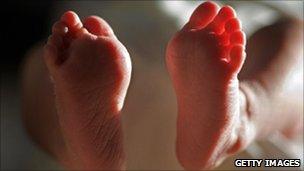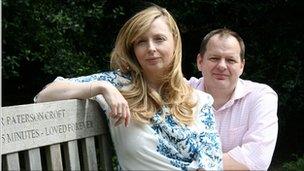Substandard care linked to maternal deaths in London
- Published

The birth rate in the UK has risen 16% in the past five years
Proper maternity care could have prevented the deaths of 17 women in London over 18 months, according to a report seen by BBC Panorama.
The NHS in London asked an independent body to investigate after the number of maternal deaths in the first half of 2009 exceeded the total in 2008.
Their report concluded 17 out of 42 deaths could have been avoided.
NHS London's chief nurse said it has addressed shortcomings in maternity services across the organisation.
Professor Trish Morris-Thompson, who is also a practising midwife with NHS London, she said: "There were a number of opportunities to prevent death occurring and because of that, we have taken enough action across the organisations in London and we will continue to do so to put right those actions."
Professor Morris-Thompson added that while "less than optimum care was given and death did occur, however, in the context of 200,000 births during that period a lot of women were cared for".
The report also found that some of the hospitals' own inquiries into the deaths were not always accurate or objective.
Of 29 serious incident reports scrutinised for the independent review, the panel of experts only agreed with the findings in 12 of them.
Their report states that many hospital-based inquiries were "defensive in nature."
The panel disagreed with six of those inquiries that concluded the deaths were unavoidable, saying "different management and earlier diagnosis could have changed the outcomes."
'Pressure relentless'
The report also discovered many of the mothers did not get in touch with maternity services until late in their pregnancies.
Of the 42 mothers who died, half were from deprived backgrounds and two thirds were from the black and ethnic minority population.
Panorama has also used Freedom of Information requests to survey the provision of maternity services across the UK.
The programme contacted every maternity unit in the UK - 171 in total - and received replies from 88%.
The findings reveal that maternity units temporarily closed their doors to new admissions 1055 times in 2010, resulting in at least 927 women needing to be transferred to other maternity units, a 32% increase from 2009.
These closures were caused by staffing issues in almost 50% of the cases, with units being at capacity the second most cited reason.
The survey also asked what the vacancy rate for midwives was at each unit.
In Wales and Northern Ireland it is below 1% and in Scotland just above 1%. The vacancy rate in England is nearly 5%.
But in some London NHS trusts the rate is as high as 20%.
The Royal College of Midwives (RCM) estimates that at least an extra 4,700 midwives need to be employed across England and Wales to provide a safe service.
The college's Cathy Warwick said: "The problem I think for midwives now is that the pressure is relentless and none of us can keep our standards as high as they should be if day after day we're working under extreme pressure."
In a statement, Health Minister Paul Burstow said: "Safety is paramount in the NHS and all mothers and their babies should expect and receive consistently excellent maternity care.
"We will continue to work with the Royal College of Midwives to make sure we have an appropriately resourced and skilled maternity workforce based on the most up-to-date evidence."
No heartbeat
The staff shortages come as the UK experiences the highest number of births in almost 20 years - in 2010.
A rise in overweight and older mothers and an increase in multiple-births linked to IVF treatments has left some maternity services struggling.

Heather Paterson and Iain Croft have since had two more children
Heather Paterson was 40 when she became pregnant with her first child.
At nearly two weeks overdue she was booked into London's Royal Free Hospital to be induced but was turned away because of a shortage of beds and staff.
She and husband Iain Croft returned the next day but the couple said Ms Paterson's midwife was dealing with another woman in labour and kept leaving Heather alone. She asked Mr Croft to keep an eye on the machine that was monitoring the baby's heart rate.
Mr Croft said he called the midwife three times when the heart rate dipped but still she did not stay in the room or call a doctor.
Three hours later, when the baby's heart rate could not be heard, a doctor was called and Ms Paterson was rushed for an emergency delivery.
The delay starved baby Riley of oxygen and he died 35 minutes later.
"I was a healthy woman. I had a healthy baby. And so you expect that you'll walk out of that hospital the next day, with your child. And to not do that was devastating," Ms Paterson said.
At the inquest, a jury ruled that neglect contributed to the baby's death.
The couple complained to the Nursing and Midwifery Council (NMC) about the conduct of two midwives.
They claimed one midwife verbally abused Ms Paterson and the second was neglectful over the monitoring of the baby's heart rate.
The NMC ruled their fitness to practice was impaired. A full decision on the midwives' futures will be made in September.
Panorama: One Born Every 40 Seconds, BBC One, Monday, 25 July at 2030BST and then available in the UK on the BBC iPlayer.
- Published25 July 2011
- Published29 June 2011